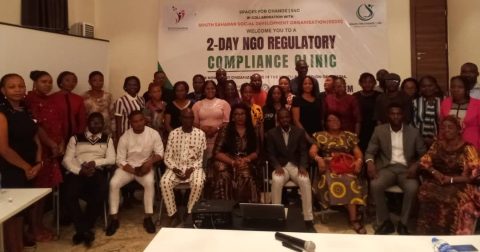Group Partners SSDO To Train Southeast NGO Operators On Regulatory Compliance, Accountability
Featured, Latest Headlines, News Across Nigeria Tuesday, October 22nd, 2024
(AFRICAN EXAMINER) – A private firm, Spaces for Change (S4C), in collaboration with a Civil Society group, South Sahara Social Development Organization (SSDO), have trained operators of Non governmental organizations NGOs, on regulatory compliance, in order to strengthen transparency and accountability.
Our correspondent writes that some of the resource persons during the two day programme were drawn from the Corporate Affairs Commissioner (CAC), Economic and Financial Crimes Commission (EFCC), the Special Control Unit Against Money Laundering (SCUML), amongst others.
The regulatory compliance clinic for nonprofit organizations in the South-East region of Nigeria, was held in Enugu over the weekend.
According to the organizers, the clinic served as a crucial platform for nonprofits organizations in the region to enhance their operational standards, ensure compliance with regulatory bodies and improve transparency and accountability among non-government organisations.
The two-day retreat drew representatives from various sectors, including health, education, research, and community development as it covered a wide range of regulatory issues, from taxation and pensions to healthcare and other governance-related matters.
Speaking at the event, Executive Director of Spaces for Change, Victoria Ibezim-Ohaeri, explained that the clinic was designed to help nonprofits organizations, both national and international, to navigate the complexities of regulatory compliance in Nigeria.
She said “The essence is to equip organizations with the resources, skills, and knowledge they need to run efficient, transparent, and accountable institutions,”
Ibezim-Ohaeri further explained that the participants, largely made up of non-governmental organizations (NGOs), were eager to strengthen their internal control systems and gain a deeper understanding of the legal and regulatory requirements applicable to their operations.
“They want to know the laws and adhere to those regulations, so they will be capable and strong enough to continue delivering their charitable and humanitarian activities.
“Complying with these regulations is not easy—it comes with costs, burdens, and human resource challenges,” Ohaeri said.
“We want to understand these challenges so we can provide feedback to regulatory bodies and find ways to address them.”
Ohaeri noted that many NGOs often make compliance mistakes out of a lack of knowledge.
“The gap in knowledge is why the clinic was developed. Many of the mistakes some organizations make are innocent mistakes, coming from not knowing the right thing to do.
“By realizing the right steps and starting to follow them, we are addressing the issue”, she noted.
Also speaking, the Finance and Administration Manager of South Sahara Social Development Organization, Udoamaka Okoye, stressed the importance of such a programme in educating participants on compliance.
She said “Today, we are collaborating with Spaces for Change to gather NGOs in the South-East and talk about the importance of compliance and legal requirements as it relates to NGOs,”
Okoye, however, shared her organization’s recent success in meeting regulatory standards, saying, “We went through the assessment of the Enugu State Internal Revenue this year, and by the grace of God, we scaled through with no legal issues whatsoever.”
She equally pointed out the lack of awareness among some NGOs about the requirements they must fulfill.
“There is a gap in understanding what they need to do in terms of documentation, filing, and paying taxes, among other things.”
On the issue of differentiating genuine NGOs from fraudulent ones, Okoye emphasized the role of the Corporate Affairs Commission (CAC) in ensuring transparency.
“If an NGO is not on the CAC portal, you know that the person is just a fraudster.
“For any donor to give you money as a nonprofit, you need to have systems in place to account for those funds. If you fail to do so, you will be blacklisted from receiving future donations from international organizations and philanthropic bodies”, she said.
“The importance of this seminar is to make us aware of the implications of not being compliant. That is why we are here today.”
About 45 participants from 35 organizations attended the event with a view to getting their skills in legal and regulatory frameworks sharpened.
A Participant and Executive Director, Women Empowerment and Peace Building Initiative (WEPBI), Ijeoma Joy Oguadimma, who spoke to newsmen, applauded the organisers of the programme.
She said “The Regulatory compliance clinic is such a wonderful training”, she said.
“There are lots of regulatory compliances to go home with, because during the training, one of the speakers spoke extensively on compliance.
“A lot of things I wasn’t doing rightly before now, but I will go and work on them.” She stated.
Related Posts
Short URL: https://www.africanexaminer.com/?p=98558






















